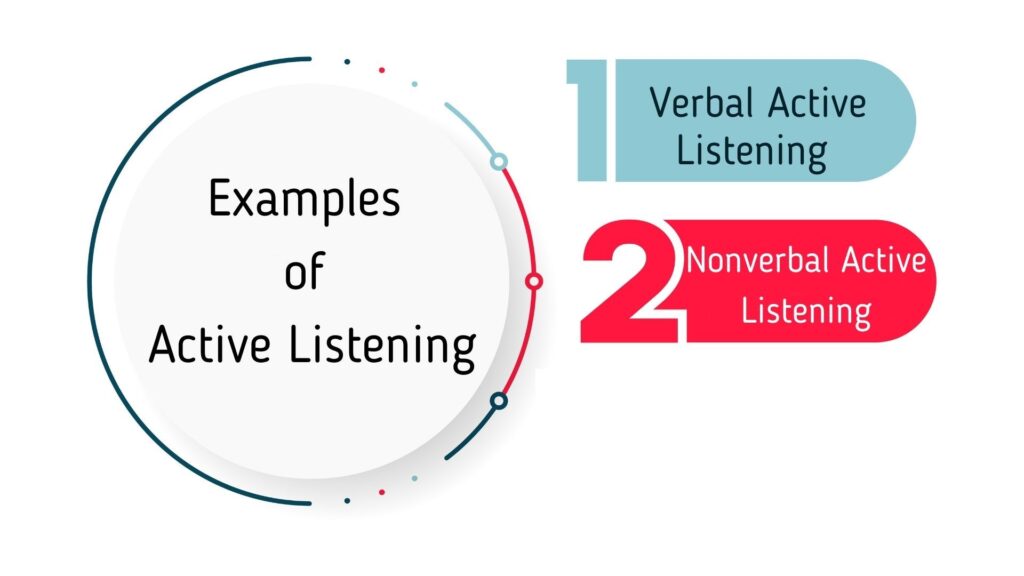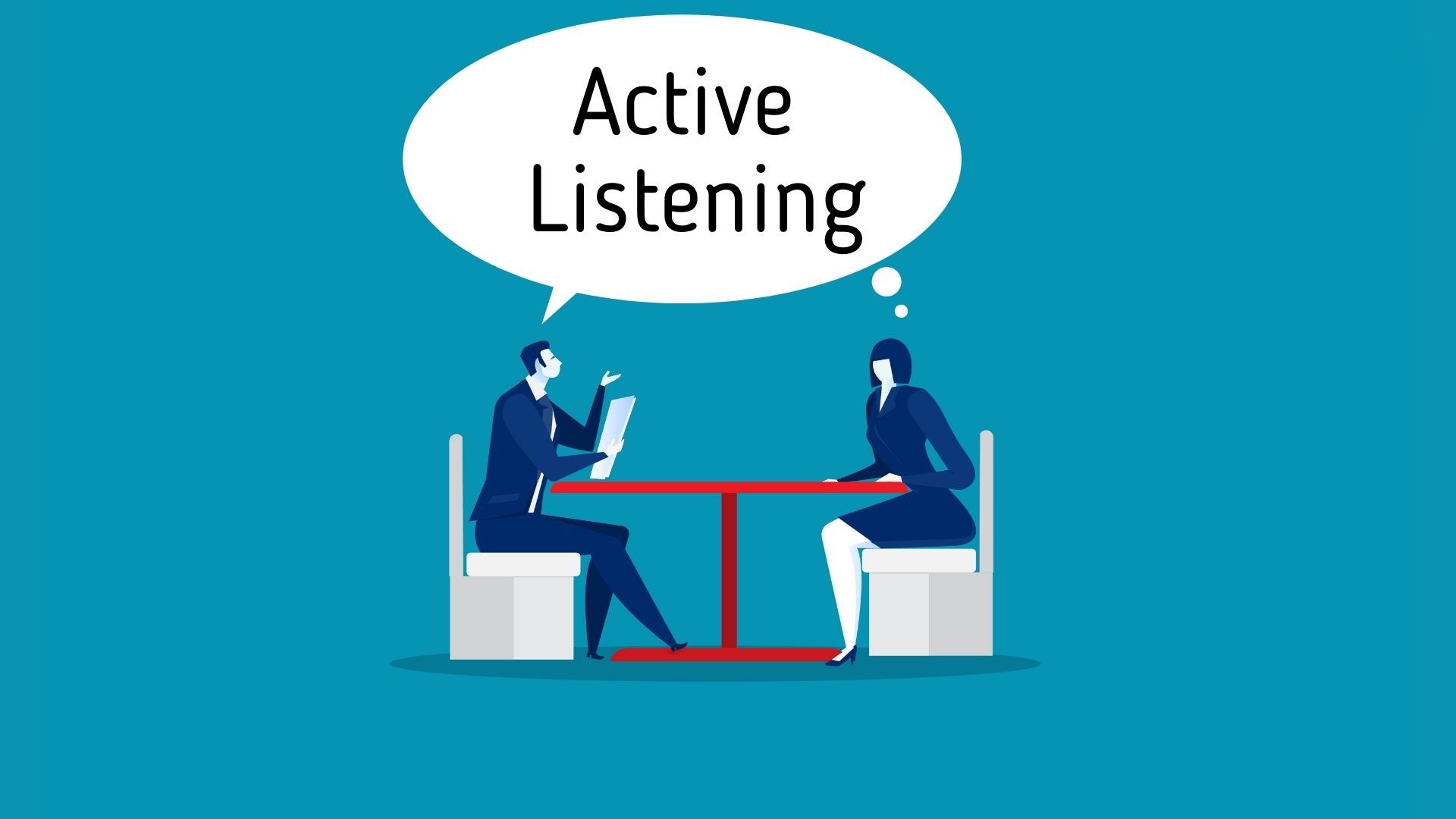Active listening refers to the set of soft skills that include paying attention, reflecting, withholding judgment, clarifying, sharing, and summarizing skills. Active listening skills utilize verbal and non-verbal techniques to show and pay attention to the speakers.
Active listeners have the ability to focus which makes it evident for the speakers to see that you are focused and engaged. Practising active listening skills empowers you to listen to understand, and you would not be worried about the responses/answers that you should give once the speaker is done.
Interviewers rate the active listening skills of the participants quite keenly, as it lets them understand your body language, facial expressions, and interpersonal skills to pay attention. All in all, active listening involves the ability to focus completely on a speaker.
What is Active Listening?
Active listening is the skill to focus entirely on the speaker, know their message, grasp the information and answer considerately. Contrary to passive listening, which is not listening to the speaker wholeheartedly and not understanding the message.
Active listening is a high valued communication skill as it ensures that the listeners are involved in an engaging conversation. Further down the line, the listener can recall the conversation with minute details. By practising active listening, you will be able to-
- Understanding speakers’ message
- Comprehending/retaining the message motive and information
- Responding thoughtfully
Active listening is just the opposite of passive listening, as a passive listener would just hear a speaker without retaining their message.
Verbal and nonverbal methods are prevalent for active listeners to portray their focus on the speaker throughout the conversation.
This skill set enhances the aptitude to focus, but the speaker indicates that the listener is actively listening. There is no need to mentally rehearsing or thinking about what to say and wait for the speaker to finish.
At the core of the active listener carefully understands the speaker’s words and leaves the data to memory.
Importance of Active Listening at Workplace

Irrespective of whether an employee is striving to earn a promotion or seek a new job opportunity. Whenever an employee showcases listening carefully, people will be intrigued to communicate with that employee regularly.
This opens up chances for the employee. This technique increases employee value and is as effective as conflict resolution and critical thinking. The various advantages of active listening at the workplace are as follows:
1. Active listening enhances understanding regarding different topics
All the successful employees are on the lookout to learn more. They are always looking to increase their knowledge base to stand out from the crowd. Active listening helps to retain information and enhances the understanding of new topics to apply the same knowledge in his future endeavours.
2. Active listening skills optimize trust-building
When an employee’s peers feel they can share anything with their colleagues without hesitation, it builds trust. The freedom of speaking without any judgments, interruptions, and unwelcome interjection, satisfies their social needs. This comes in handy while dealing with new customers with whom an employee intends to build a long-term relationship.
3. No missing of vital information when you actively listen
As all active listeners are submerged with the speaker’s thoughts and message, they can recall critical information when they require it. This comes in handy when the speaker explains instructions, delivers a new message, or trains a new process.
4. Active listening assists in identifying and solving problems
Active listener gauges all the problems and challenges others are facing. The faster these issues are ironed out, the better it is for the entire organization. As the time taken to come up with a plan or solution reduces significantly.
5. Active listening channelizes connection building
Active listeners make others feel comfortable to share their thoughts and information. If an active listener shows a keen interest in any person regarding what they have to say, they start communicating regularly. This opens up avenues for future collaborations, works get done promptly, and projects are successful. All of these factors help in achieving success in a career.
6. Active listening makes an employee popular
If everybody feels comfortable sharing their feeling, then that employee becomes popular. Being popular means, you’ll have the support of many people during tough times. Also, being popular among peers can never go wrong in the long-run success of the career.
Examples of Active Listening

Verbal Active Listening Examples
1. Recall prior information
It is better to memorize key vital ideas, concepts, or points that the speaker shares. This not only showcases that you are listening curiously, but you are retaining vital information as well.
2. Portray Empathy
The speaker must know that the audience is connecting with him on an emotional level. An active listener must show compassion while listening; this helps to understand the speaker better and build mutual trust.
3. Ask precise analytical questions
Direct questions related to the speaker are always a good gesture. This forces the speaker to elaborate on narrower topics or concepts so that the audience is enlightened properly.
4. Paraphrasing
Jotting down the main points of the message as a summary highlights the meaning of the speaker’s message. This also helps the speaker to clarify vague information and improve the meaning of the message.
5. Share the same experiences
Sharing the same experiences with the speaker solidifies that the message has been successfully interpreted. This also builds a relationship with the speaker. If the speaker put forward a question, then providing a solution with your personal experience boosts further synergy.
6. Using short verbal confirmations
Small positive responses help the speaker feel more uncomfortable and portray high involvement levels. Using short verbal confirmations helps you continue the conversation without interrupting the flow or disrupting the speaker’s speech.
7. Open-ended question
The questions should be of the topic’s similar essence in hand and open-ended question. This initiates a healthy conversation with the speaker that leads to more exchange of valuable information.
Nonverbal Active Listening
1. Eye contact
There should be constant eye contact with the speaker. Avoiding looking here and there or towards other people in the audience. Ensure to keep the look natural by utilizing smile, nods to encourage the speaker rather than intimidating the speaker.
2. Smile
Similar to eye contact, a good smile boosts the confidence of the speaker. Unlike eye contact, it tells the speaker that you agree or disagree with the points. Smiles are the best form of short verbal affirmations in dissolving the tension in the room.
3. Nod
A light nod towards the speaker helps the speaker in understanding whether the message is delivered or not. It is a helpful cue and doesn’t necessarily tell the speaker whether you agree or not, like that of a smile. This only tells the speaker that the meaning of the message has been communicated.
4. No distracting movements
Having a still statue communicates the focus to the speaker. Try to avoid looking at the watch continuously, sighing audibly, tapping a pen, or moving the feet. There shouldn’t be any verbal or nonverbal communication with the other members of the crowd. All of these can make the speaker uncomfortable and frustrated.
Wrap Up!
Being an attentive listener will empower you in being a good leader, as you will be able to understand the points of view and perceptions of different members.
It is also quite effective in improving your relationships with others. Your active listening ability will make you a good listener that will be useful for you if you are seeking a new job opportunity or opting to improve your current role or seeking to get a job promotion.
Finally, your active listening skill will optimize your value as an employee, leader, or manager.
How important do you find active listening skills for leading a successful life? Share your views with us in the comment section below.
Pinky is an MBA in Marketing from the University of Mumbai. She loves helping people out in learning Marketing and sharing latest ideas and tactics for growing businesses.
